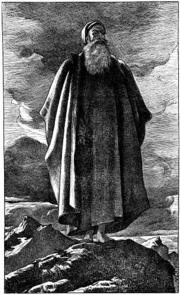Was Moses even a Hebrew? The tradition relates that after the future exodizer is born to Hebrew parents, his mother floats him down the Nile in a basket to escape Pharaoh's command that all newborn Hebrew boys be killed. So Pharaoh's daughter finds and raises him.
That's the cover story. But the myth offers scant connection between Moses and the race of his supposed birth. The prominent self-questioning Jew Sigmund Freud was among the first to suggest that the legend of Moses was meant in part to indicate the actual source of Israel's monotheism -- namely Akhenaten, the heretic Pharaoh who temporarily diverted Egyptian religion from polytheism. Some say that the biblical Exodus represents not the flight of oppressed Israelite slaves, but the relocation of an Egyptian monotheistic minority (pariahs after the fall of Akhenaten) to a new land, and it was from these refugees that Israel eventually learned to worship a single deity.
The Old Testament holds some clues that the character of Moses did not originate as a Hebrew. First, he is raised as an Egyptian with an Egyptian name. Second, when he kills an Egyptian for mistreating an Israelite, Moses escapes into exile, where he marries not a Hebrew, but a Midianite woman, Zipporah.
Perhaps logically, God chooses this border-crossing man to be his intermediary in approaching Pharaoh about freeing the enslaved Hebrews. Then, seemingly out of nowhere, God decides to kill Moses. And that's where the third clue comes in.
In Exodus 4:24-26, Moses is on the road to accost Pharaoh when the Lord comes to execute the death sentence. Zipporah, apparently understanding the reason for the attack, immediately grabs a piece of flint and whacks off their son's foreskin, dropping it at Moses' feet and calling him a "bloody spouse," her Midianite heritage possibly rebelling against this painful, gory practice. God is appeased.
The context: Immediately before this, God has instructed Moses to tell Pharaoh that Israel is God's firstborn, and unless the Chosen People are released, God will kill Pharaoh's firstborn. The unstated implication is that Moses, in order to utter such a challenge, must stand worthy in the case of his own firstborn -- who, contrary to the Covenant, is not circumcised.
Given that the son, Gershon, is the offspring of a gentile woman and of Moses, who was raised by Egyptians, the retention of his prepuce up to that point doesn't seem unlikely. In fact, Exodus suggests that, although circumcision was practiced -- not universally -- by Egyptians (a fact not mentioned in the Torah) as well as by Hebrews, Moses himself was not circumcised.
The veiled revelation of this condition arrives in Exodus 6:12 and again in 6:30. Moses is complaining about being assigned as an interlocutor despite his lack of qualifications: He calls himself what the New American Bible translates as a "poor speaker" and the King James Version more literally renders as "of uncircumcised lips." For "uncircumcised," Moses uses the Hebrew word "arel," which at root refers to something loose or disordered, particularly a foreskin. Moses' choice of terminology (he says "uncircumcised" twice, and the word doesn't relate to lips anywhere else in the Old Testament) is hard to justify unless he intends to imply that it applies "as above, so below."
Does it matter whether Moses was a Hebrew, was circumcised, or existed at all? No. Just trying to observe that marks of distinction are pretty damn common, and older than God himself.

